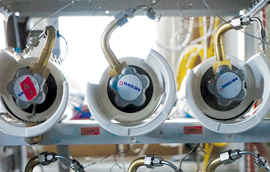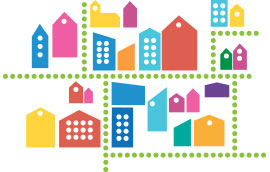Potential Assessment of Measures in the Field of Building Technology
Where and how high are the potentials for increasing energy efficiency and reducing greenhouse gas emissions (GHG) in building technology?
The starting point for a potential assessment is the comprehensive and compact presentation of the current state of building technology in the Swiss building stock. In our study for the Swiss Federal Office of Energy (SFOE), we analysed how energy is used within the areas of heating, hot water, ventilation, air conditioning, lighting and general building technology. Building on this, we defined the technical and operational measures and evaluated them in terms of their application possibilities and impact. We looked particularly at end energy, greenhouse gas emissions and primary energy (divided into total and non-renewable primary energy). We reported the emission reduction potential as CO2 equivalents. All building categories were considered in the study, with a special focus on residential, office and school buildings.
The study forms the basis for the implementation of measures in the field of building technology and for the development of instruments for the implementation of the confederation's Energy Strategy 2050.

Project infos
project Project duration2014 bis 2015
Contact at TEP EnergyMartin Jakob
Contracting partySFOE
Support groupConference of Building Technology Associations (KGTV)
LinksEnergieSchweiz
Abridged version(PDF, in german)
Final report(PDF, in german)
Reference projects

Net-zero greenhouse gas emissions in the building sector | TEP Energy
Together with partners, TEP Energy is developing methodological principles (F0) based on the WLCNN method, examining the achievability of net-zero targets (F1) using technical and economic scenarios and developing implementation strategies (F2, F3) with technical and political concepts. In addition, existing standards are analysed in order to harmonize regulations and ensure comparability (F4).

Energy renovation rates in the building sector
Various federal and cantonal energy and climate policy measures are aimed at significantly increasing the energy renovation rate. Based on this comprehensive survey, the report shows how the energy renovation rate has developed in recent years and how high it currently is.

Solar energy strategy and potential study in Wädenswil | TEP Energy
TEP Energy is conducting a solar strategy and potential study to accelerate the expansion of solar energy in the city of Wädenswil.

SURE - SUstainable and REsilient energy for Switzerland
Sweet - SURE analyses the impact of disruptive events on the Swiss energy system. TEP Energy is working on energy demand topics such as the development of demand for energy sources in Switzerland, the impact of shocks on the demand load and the potential use of large heat pumps.

Criteria for Climate-Compatible Building Financing in Switzerland
TEP Energy and Raffeisen Schweiz show clear criteria on how to invest in climate-friendly buildings.

Data centers in Switzerland - Electricity consumption and efficiency potential
Due to a substantial and increasing amount of electricity consumption by servers rooms/data cetners in Switzerland, it is important to analyse the electricity demand and energy efficiency potentials.

Calculation Tool for 2000-Watt Sites II
Revised calculation tool for the evaluation of settlement areas regarding indicators of the 2000-watt society.

Country-specific Market Reports for Buildings
Building Market Briefs (BMB) is a Climate KIC initiative within the flagship Building Technologies Accelerator (BTA) that aims to gather and promote knowledge about the buildings' and construction sector to promote low carbon investment and scaling.

Ex-Post Analysis of Energy Demand in the Swiss Service Sector
Together with Prognos and Infras, we periodically carry out ex-post analyses of the energy demand in Switzerland on behalf of the Swiss Federal Office of Energy (SFOE). TEP Energy is responsible for the sectors services and agriculture.

PUEDA+: Promotion of energy efficiency in data centers and server rooms
Program to promote energy efficiency in the Swiss IT industry

New Trends in Energy Demand Modelling
In this Horizon2020 project, the impact of new societal trends on the energy consumption are modelled and analysed.

LICS – Low-investment-cost retrofit solutions
Potentials and limitations of existing and new low-investment-cost retrofit solutions to achieve a benchmark of 6 kg CO2 per m2 in existing buildings

Reference Values of Cooling Systems in Buildings
Compilation of cooling reference values and improvement of the data basis to have a better support for strategic building planning

Funding Programme SOKAS: System Optimisation of Industrial Refrigerating Plants
The subsidy programme SOKAS supports the sustainable system-wide energy optimisation of large cooling and refrigeration plants. In addition to lower energy costs, system operators benefit from an attractive subsidy of up to 40% of the total project costs.

REFLEX Project: Flexibility and Technological Development in the European Energy System
REFLEX focuses on techno-economic learning, fundamental energy system modelling and social and environmental life cycle analysis.

Heat Roadmap Europe (HRE) – Study on the European Heating and Cooling Market
In Europe, the energy system is to be decarbonised in the long term, i.e. no more CO2 emissions will be emitted. We estimate energy efficiencies cost potential curves for 14 European countries.

The Role of Gas Infrastructure in the Future Energy System
Energy policy decisions and technological developments lead to an increase in fluctuating renewable energy production. More flexibility in the power grid and storage possibilities is required to which the buildings' sector may contribute.

EEG Platform: Efficiency and Renewable Energy in Buildings (EEG)
Through the EEG platform, the developed actions from the EEG Action Plan can be jointly further developed and implemented throughout Switzerland.

EEG Workshop: Energy Efficiency and Renewable Energies in Buildings (EEG)
The EEG Workshop on Energy Efficiency and Renewable Energy in Buildings (EEG) is part of the global programme "Energy Efficiency and Building Technology Accelerator" (EEB) of the World Business Council for Sustainable Development (WBCSD) and Climate-KIC.

CREAM – Integrating Climate Change Mitigation, Resource Efficiency and Adaptation in Building Stock Modelling
Objectives, strategies and measures in the field of climate protection, energy planning and the further development of energy networks in cities are designed using the Building Park Model (GPM) in a cross-sectoral manner.

Study on the Subsidiary Ban of Fossil-Fuelled Heating Systems
Swiss climate policy is facing major challenges, especially in the buildings sector. The study investigated the effects of a possible ban on fossil-fuelled heating systems from 2030, if the climate targets cannot otherwise be achieved.

Energy-Saving Contracting
Increasing energy efficiency is one of the central pillars of Swiss energy policy and energy-saving contracting contributes to this goal.

INSPIRE Tool: Energetic, Ecological and Economic Renovation of Buildings
With the INSPIRE tool you can calculate energy, ecological and economic indicators as well as strategies for the reduction of greenhouse gas emissions (GHG) and primary energy consumption of buildings.

Mapping and Analyses of the Current and Future (2020-2030) Heating/Cooling Fuel Deployment (Fossil Fuels/Renewables) in Europe
The energy balances of statistical offices in many countries and Eurostat are often incomplete. This EU service contract maps current and future energy demand for heating and cooling.

Instruments for Implementing Efficiency Measures in Building Technology
Which instruments support the implementation of efficiency measures in building services engineering as effectively and efficiently as possible?

Extension of the Building Stock Model for the SIA Efficiency Path
Using the enhanced building stock model, the primary energy and greenhouse gas emissions of new buildings and renovation projects are compared with the target values to review the impact of energy policy objectives.

Energy Supply Concept 2050 for the City of Zurich
The Energy Supply Concept 2050 used a scenario approach to show that the heat supply of the city of Zurich could meet the goals of the 2000-watt society.

Analysis of Market Opportunities and Potentials in the Heating and Cooling Sector
Evaluation of new market opportunities on behalf of a large Swiss electricity supplier.

Economic Analysis of Measures for the Energy Strategy 2050 – Efficiency Regulations for Electrical Appliances
With the Energy Strategy 2050, the Federal Council is pursuing the goal of significantly reducing electricity consumption in Switzerland by 2050 compared with a reference development.

Electricity Efficiency of the Swiss Economy – Evaluation and Scenarios of the EnAW
The impact of EnAW's previous activities in the field of electricity efficiency is statistically evaluated and the future development is bottom-up estimated.

Pilot Study: Building Stock Model (BSM) for Office, School and Residential Buildings
In collaboration with the ETH Chair for Sustainable Building, we developed a pilot version of the building stock model for Switzerland and for the city of Zurich.
